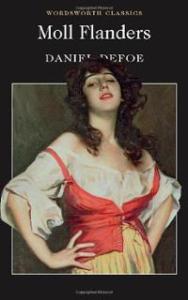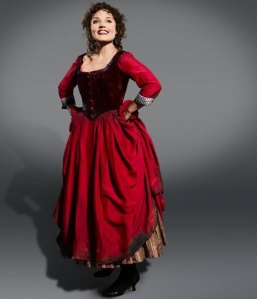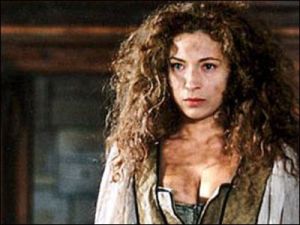
Are criminals born or made by society and circumstances? There are many ways to tackle this debatable question. I will be utilizing Daniel Defoe’s characterisation of Moll Flanders in order to form my own personal response, while also acknowledging Defoe’s intended approach.

It is firstly interesting to observe the representation of Moll’s persona on the book cover pictured above. It seems almost satirical, as her body language is informal and she stands confidently with her hands on her hips, perhaps demonstrating that she is unashamed of the life she has led. Her clothes appear to represent the typically working-class Victorian woman, while it could be suggested that theme of red on her both her clothing and lips creates a sultry appearance, similar to that of Nancy in stage productions of Oliver Twist. Consequently, she appears as a relatable and almost familiar character to the audience.
We can identify in chapter two in particular that Defoe construes the idea that criminals are directly impacted by the circumstances they are born into. The protagonist, Moll, narrates the story, informing us that her mother left her ‘about half a year old; and in bad hands, you may be sure’. (1) This creates the sense that Defoe is subtly excusing her actions from the start and highlighting that her troubled childhood was a catalyst for the turbulent life she leads throughout the novel.
It is difficult to avoid possessing some sympathy for Moll, as it is so evident that the lack of positive role models and stability as a child have been a root of her problems. Coinciding with these thoughts, criticism has noted that ‘What is disturbing about Moll Flanders is how she is like us—or like what we might become if we were scrabbling hard to pull ourselves up in the world. The fact that Defoe has written a novel that gets us to sympathize with her helps explain why moralists were so suspicious of the novel in the 18th century. While Defoe claims to condemn her, we can’t help but cheer’ (2)

Despite this, Defoe also appears to challenge these ideas, as Moll explains how she was taken in by a poor but good woman, who she describes to have brought her up as ‘mannerly’ in a comfortable environment. From this we could argue that Moll has experienced some form of a positive influence in slightly later life, yet she has either been already too influenced negatively to change, or people are born as criminals no matter what their circumstances are.
Considering all of these ideas, to me it seems inevitable from the beginning that it would have been almost impossible for Moll to live an honest and simple life. Her childhood was far from easy and it seems as though Defoe almost satirizes stereotypically petty ‘female crime’ such as theft and prostitution. Since Moll doesn’t actually commit an act of murder, a small sense of her morality is kept in tact and she is not dehumanised. The emphasis that Moll originally makes on being ‘born into such an unhappy place’ cannot be ignored, as it is implied that there was never any hope for her to succeed without crime, even if she may have wanted to.
References:
(1) Defoe, D (1722) ‘Moll Flanders’ Chapter 2 The Literature Network
(2) Bates, R (2013) ‘Moll Flanders, Quintessential Capitalist’ Better Living Through Beowulf
Bibliography
Image of ‘Moll Flanders’ Wordsworth Classics book cover http://www.tower.com/moll-flanders-daniel-defoe-paperback/wapi/100029858
Image of Keeley Hawes as Moll Flanders in television adaptation http://www.betterlivingthroughbeowulf.com/moll-flanders-quintessential-capitalist/
Bates, Robin ”Moll Flanders, Quintessential Capitalist’ Better Living Through Beowulf (2013)
Defoe, Daniel ‘Moll Flanders’ Chapter 2 The Literature Network http://www.online-literature.com/defoe/moll_flanders/2/
